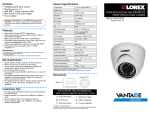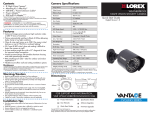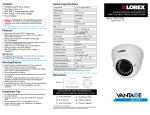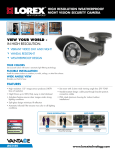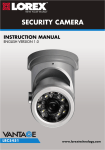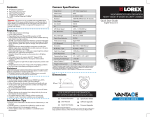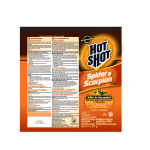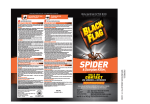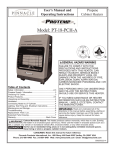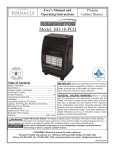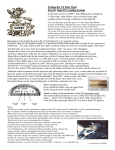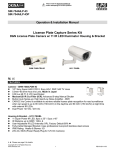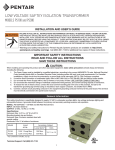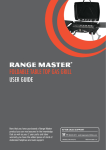Download LOREX Technology LBC5450 User's Manual
Transcript
Contents •High Resolution Color Camera with cable passthrough stand •Mounting screws x 3 / Allen key x 1 •60ft BNC / power extension cable •BNC female / RCA male adapter •Power adapter WARNING - A REGULATED UL / CSA APPROVED power supply is REQUIRED for use with this camera. Use of a non-regulated, non-conforming power supply can damage this product and voids the warranty. Features • High resolution 1/3” image sensor produces 540TV lines of resolution • Night vision up to 50ft (15m) away in total darkness* • Anti-glare feature ensures clear images under strong lighting conditions • Accurate colors with Lorex’s automatic light-filtering technology • Split glass design minimizes IR reflection • See more with 3.6mm wide viewing angle lens (78° FOV**) • Vandal-resistant design: cable pass-through bracket protects connection cables • IP66 rated aluminum housing for indoor / outdoor installations*** Disclaimers: * Infrared illumination range under ideal conditions. Actual range and clarity may vary depending on scene / object reflection and camera application. ** Field of View, diagonal *** Not intended for submersion in water. Installation in a sheltered location recommended. Warning/Caution • Read this guide carefully and keep it for future reference • Follow all instructions for safe use of the product and handle with care • Use the camera within given temperature, humidity and voltage levels noted in Camera Specifications • Do not disassemble the camera • Do not point the camera directly towards the sun or a source of intense light • Use only the supplied regulated power supply. Use of a nonregulated, non-conforming power supply can damage this product and voids the warranty • Periodic cleaning may be required. Use a damp cloth only. Do not use harsh cleaners or aerosol cleaners. • The supplied extension cable is rated for surface mounting only • Cables for in-wall / floor-to-floor installations are sold separately Installation Tips • Point the camera where there is the least amount of obstructions (i.e. tree branches) • Install the camera in a location that is difficult for vandals to reach • Secure cabling so that it is not exposed or easily cut • Camera rated for outdoor use. Installation in a sheltered location recommended Camera Specifications Image Sensor 1/3” Color Image Sensor Video Format NTSC Effective Pixels H: 720 V: 480 Resolution 540 TV Lines Scan System 2:1 Interlace Sync System Internal S / N Ratio 48dB (AGC Off) Iris AES AES Shutter Speed 1/60 ~ 1/25,000 sec. Min. Illumination 0.1 Lux without IR LED 0 Lux with IR LED Video Output Composite 1.0Vpp @ 75ohm Lens / Lens Type 3.6mm F2.0 / Fixed FOV (Diagonal) 78° Termination BNC Type IR LED Qty. / Type 18 pieces / 850nm Night Vision Range* 50ft / 15m Power Requirement 12V DC ±10% Power Consumption Max. 300mA (w / IR) Operating Temp. Range 14° ~ 122°F / –10° ~ 50°C Operating Humidity Range < 90% RH Environmental Rating** IP66 Weight (including stand) 0.8lbs / 0.4kg HIGH RESOLUTION IR NIGHT VISION CAMERA Quick Start Guide English Version 1.0 * IR Illumination Range under ideal conditions. Objects at or beyond this range may be partially or completely obscured, depending on the camera application. ** Not intended for submersion in water. Installation in a sheltered location recommended. Dimensions 67mm / 2.6” 189mm / 7.4” 60mm / 2.4” FOR SUPPORT AND INFORMATION, VISIT WWW.LOREXTECHNOLOGY.COM Product Information Specification Sheets User Manuals Software Upgrades Quick Start Guides Firmware Upgrades Copyright © 2012 Lorex Technologies Inc. As our products are subject to continuous improvement, Lorex reserves the right to modify product design, specifications and prices, without notice and without incurring any obligation. E&OE LBC5450 Installing the Camera ATTENTION - Test all connections and ensure the camera is working correctly prior to permanent installation by temporarily connecting the camera(s) and cable(s) to the viewing / recording solution. Connecting the Camera To Camera: Cable Extension Options To Monitor/DVR: Option Before installing the camera: • Decide whether to run the cables through the wall / ceiling (drilling required) or along the wall / celing. • If you run the cables along the wall / ceiling, you must run the cable through Cable Notch the cable notch on the base. This will keep the camera base flush to the wall / ceiling when mounted. To install the camera: 1. Set the camera in the desired mounting position and mark holes for the screws. Extend the cable run for your camera up to 300ft or more depending on the cable type used. See table below: Female Power Male Power BNC Connect the BNC and power connectors to the camera Connect the BNC connector to the video input of the monitor / DVR, and connect the included power connector to a power adapter. See Setup Diagram below for details. BNC to RCA Adapter (Optional) Cable Type Regular BNC (supplied with camera) 180ft / 55m 3 2 ‘RG59’ or ‘Coax’ or ‘Coaxial BNC’ (sold seperately) 300ft / 92m 5 3 Lorex Universal Cable (sold seperately) 300ft / 92m 3 Notes: 1. For optimal performance, consider using option 2 or 3. It is best to use the same cable type for the entire distance. 2. Cable run recommendation based on typical camera power consumption (up to 500mA). For specialty cameras with higher current consumption, maximum cable run may be reduced. Consider providing power to the camera at the camera side, rather then at the end of the extension cable. 3. Indicators that your cable run may be too long: • Video is permanently black & white (even during day time) • Video is distorted Troubleshooting 2. Loosen the screw near the stand and adjust the camera’s vertical position. 1. Twist the ring to tighten/ loosen the stand connection and adjust the camera’s horizontal position. 3. If needed, loosen the screw near the camera and twist the camera head on the mounting stand. ATTENTION - This camera includes an Auto Mechanical IR Cut Filter. When the camera changes between Day/Night viewing modes, an audible clicking noise may be heard from the camera. This clicking is normal, and indicates that the camera filter is working. Solution No picture / signal •Ensure your TV is on the correct input channel. Common terms of an input channel: INPUT, AV CHANNEL, LINE1, LINE2, AUX. •If your camera is connected to a VCR / DVR, ensure it is properly connected to your TV / Monitor. •Ensure connections are properly connected. •Ensure the camera power supply is plugged in. Picture is too bright •Ensure your camera isn’t pointed directly at a source of light (e.g. sun or spot light). •Slide the sunshade (bullet cameras featuring adjustable sunshades only) forward to block excess light. •Move your camera to a different location. Picture is too dark •If using during the day, the camera may not be getting enough light. Slide the sunshade (bullet cameras featuring adjustable sunshades only) backwards to let in more light. •Check the brightness and contrast settings of the device your camera connects to (TV / Monitor / DVR). Night vision is not working •The night vision activates when light levels drop. The area may have too much light. Picture is not clear •Check the camera lens for dirt, dust, spiderwebs. Clean the lens with a soft, clean cloth. •Make sure that the cable run is within the limitations specified in the section ‘Cable Extension Options’. Bright spot in video when viewing camera at night •Night vision reflects when pointing a camera at a window. Move the camera to a different location. BNC connection does not connect to my TV. •Use a BNC to RCA adapter at the end of the extension cable. Attach the included BNC to RCA adapter to connect the extension cable to RCA inputs (i.e. for a TV connection). Setup Diagram Max # of Extensions 1 Problem 2. Drill the holes for the mounting screws. 3. Connect the video and power cables as shown in the next section ‘Connecting The Camera‘. 4. Feed the cable through the cable notch (if running the cables along the wall / ceiling) or through the mounting surface (if running the cables through the wall / ceiling). 5. Mount the camera stand to the desired surface using the provided screws. Make sure all three screws are fastened tightly at the connection points. 6. Set the position and angle of the camera using the provided Allen key. Max Cable Run Distance



